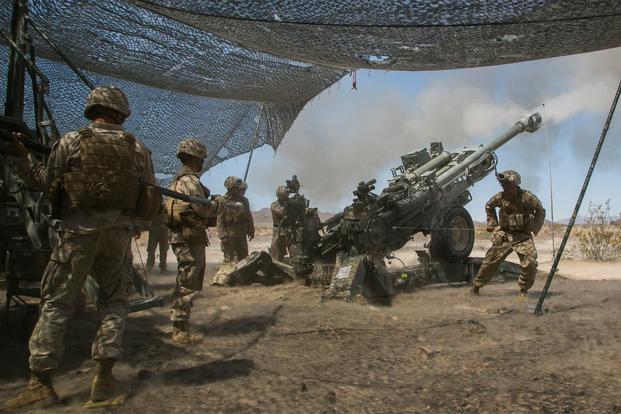A Marine Corps howitzer mission to target Islamic State militants in Iraq and Syria has seen great success against the enemy and has reinvigorated the artillery community, the commanding officer of 2nd Marine Division said Thursday.
Speaking at a Marine Corps Association and Foundation event near Washington, D.C., Maj. Gen. John Love said 1st Battalion, 10th Marines -- which deployed with M777 155mm howitzers from Camp Lejeune, North Carolina, in late September -- has distinguished itself in the ground fight against ISIS.
"We think that battery has killed more ISIS than anybody else out there right now, including special operations forces," he said.
Love did not specify where the battery is operating in the Middle East. However, defense officials have lately spoken highly of the Marine artillery detachment in Syria that provided support to local forces as they assaulted Raqqa.
Army Sgt.Maj. John Troxell, the senior enlisted adviser to Marine Gen. Joseph Dunford, chairman of the Joint Chiefs of Staff, told reporters at the Pentagon earlier this month that Marines had fired so many artillery rounds in rapid succession that they burned out the barrels of two M777 howitzers -- a far from easy feat.
Marine artillery has been part of the ISIS fight since early 2016, when a small contingent of Marines departed the deployed 26th MEU to set up a fire base in Northern Iraq, near Mosul. That unit eventually redeployed and was replaced by an Army unit.
In February 2017, a detachment of Marines, including elements of multiple artillery batteries, was dispatched from the deployed 11th Marine Expeditionary Unit to support the Raqqa assault in Syria. Unlike the Iraq fire base, the position in Syria was mobile, and repositioned multiple times to keep pressure on the enemy.
The deployment of 1st Battalion, 10th Marines, which represented the first time a Marine artillery battery had been dispatched from stateside to support the ISIS ground fight, came about seven months after the first artillery deployment to Syria.
Love told Military.com that the Corps expects to continue providing artillery support to the fight against ISIS in rotational deployments going forward.
"There's a long-term rotation plan," he said. "But I can't tell you who's next or how long or where they're going."
The Marines' 155mm cannons had been so effective against ISIS, he said, because of the firepower they brought, a devastating effect heightened by coordination with ongoing airstrikes.
The prospect of a new long-term artillery combat mission, he said, had driven new purpose into a community that for several years prior had deployed only for training or deterrence.
"It has enlivened the artillery community in the last two years," he said. "Ever since the very first Marine expeditionary unit went ashore and they've had sustained artillery ashore, it gives them a real sense of purpose ... this has put a new spark into that community."
-- Hope Hodge Seck can be reached at hope.seck@military.com. Follow her on Twitter at @HopeSeck.













